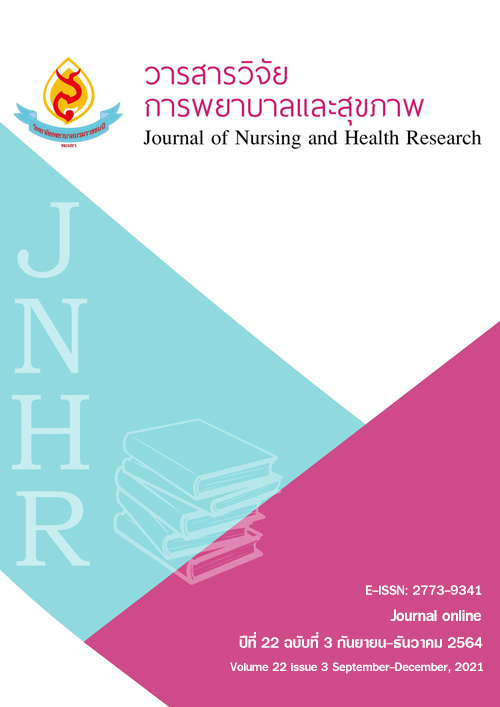ความต้องการของชุมชนต่อสถาบันการศึกษาพยาบาลในการพัฒนาศักยภาพ ด้านการดูแลสุขภาพ
คำสำคัญ:
การดูแลสุขภาพ, การพัฒนาศักยภาพ, ความต้องการของชุมชน, สถาบันการศึกษาพยาบาลบทคัดย่อ
การศึกษาครั้งนี้เป็นการวิจัยเชิงคุณภาพมีวัตถุประสงค์เพื่อศึกษาความต้องการของชุมชนที่มีต่อสถาบันการศึกษาพยาบาลเกี่ยวกับการพัฒนาศักยภาพด้านการดูแลสุขภาพของชุมชน ทำการศึกษาในเครือข่ายชุมชนและสังคมที่วิทยาลัยพยาบาลบรมราชชนนี เชียงใหม่ได้ให้บริการวิชาการ คัดเลือกผู้เข้าร่วมวิจัยแบบเจาะจงโดยมีกลุ่มตัวอย่างจำนวน 17 คน ได้แก่ ผู้บริหารหรือตัวแทนสถาบันการศึกษา ตัวแทนหน่วยบริการด้านสุขภาพ ผู้บริหารองค์การปกครองส่วนท้องถิ่น และ ตัวแทนภาคประชาชน เก็บรวบรวมข้อมูลด้วยการสัมภาษณ์แบบเจาะลึกรายบุคคล วิเคราะห์ข้อมูลใช้วิธีการเชิงอุปมานโดยใช้การวิเคราะห์เนื้อหา ผลการศึกษาอธิบายได้ในประเด็นหลัก 1 ประเด็น (theme) ได้แก่ การสนับสนุนทางวิชาการอย่างมีส่วนร่วม จากประเด็นหลักดังกล่าวสามารถจำแนกได้เป็น 2 หมวดหมู่ (categories) ได้แก่ 1) บริหารเพื่อเกิดความรู้จากบุคคลภายนอก และ 2) สร้างความรู้ด้านวิชาชีพและวิชาการ โดยหมวดหมู่แรกประกอบด้วย 2 หมวดหมู่ย่อย (sub-categories) ได้แก่ 1.1) ส่งเสริมการเกิดองค์ความรู้ใหม่ และ 1.2) ฟื้นฟูความรู้ตามความเชี่ยวชาญ หมวดหมู่ที่ 2 ประกอบด้วย 2 หมวดหมู่ย่อย ได้แก่ 2.1) แบ่งปันความรู้ต่อเครือข่าย และ 2.2) เรียนรู้ร่วมกันผ่านกระบวนการวิจัย ผลการศึกษาครั้งนี้สามารถนำไปประยุกต์ใช้เพื่อการวางแผนการให้บริการวิชาการ หรือการทำงานร่วมกันระหว่างภาคีเครือข่ายของชุมชน สถาบันต่าง ๆ ร่วมกับสถาบันการศึกษาทางการพยาบาลภายใต้การสนองตอบต่อความต้องการของชุมชนเพื่อพัฒนาศักยภาพด้านการดูแลสุขภาพของภาคีเครือข่ายที่วิทยาลัยพยาบาลบรมราชชนนี เชียงใหม่ ได้ให้บริการวิชาการซึ่งอาจจะสร้างความพึงพอใจแก่เครือข่าย เกิดการพัฒนาศักยภาพชุมชนอย่างยั่งยืน และเกิดประโยชน์ด้านการดูแลสุขภาพของชุมชน สังคมต่อไป
เอกสารอ้างอิง
โครงการสารานุกรมไทยสำหรับเยาวชน โดยพระราชประสงค์ในพระบาทสมเด็จพระเจ้าอยู่หัว. (2556). สารานุกรมไทยสำหรับเยาวชน เล่มที่ 38. กรุงเทพฯ: สำนักงานโครงการสารานุกรมไทย.
ชิรวัฒน์ นิจเนตร. (2559). บทบาทของมหาวิทยาลัยราชภัฏสุราษฎร์ธานีกับการรับใช้สังคม. วารสารวิชาการมหาวิทยาลัยราชภัฏภูเก็ต, 12(2), 193-226.
ซัยนูรดีน นิมา. (2562). ความต้องการของชุมชนต่อการให้บริการวิชาการของวิทยาลัยอิสลามศึกษามหาวิทยาลัย สงขลานครินทร์. วารสาร อัล-ฮิกมะฮฺ, 9(17), 135-143.
ณัฐพล ธนเชวงสกุล และ เอกพรรณ ธัญญาวินิชกุล. (2563). การเปลี่ยนผ่านทางการศึกษาสู่บทบาท สถาบันอุดมศึกษาเพื่อการพัฒนาท้องถิ่น. วารสารครุศาสตร์อุตสาหกรรม, 19(3), 131-142.
พระวิระพันธ์ติกฺขปญฺโญ. (2562). สถาบันอุดมศึกษาเพื่อการพัฒนาคนในยุคThailand 4.0 เป็นขุมปัญญาของประเทศ. วารสาร มจร หริภุญปริทรรศน์, 3(1), 98-114.
เพลินพิศ จุฬพันธ์ทอง, สุนทรี ดวงทิพย์, ชูชีพ พุทธประเสริฐ, และ ยุภาดี ปณะราช. (2557). การพัฒนากลยุทธ์การบริการวิชาการแก่สังคมของมหาวิทยาลัยราชภัฏกลุ่มภาคเหนือตอนล่าง. วารสารศึกษาศาสตร์ มหาวิทยาลัยนเรศวร, 16(1), 40-53.
รัชฎาพร สายสนิทและ สุทีป เศวตพรหม. (2553). ความคิดเห็นของบุคลากรมหาวิทยาลัยสงขลานครินทร์ที่มีต่อการดำเนินงานบริการวิชาการของมหาวิทยาลัยสงขลานครินทร์, วารสารวิทยบริการ, 23(1), 160-175.
รัถยานภิศ รัชตะวรรณ, ธมลวรรณ แก้วกระจก, วรรณรัตน์ จงเขตกิจ, ปิยะพร พรหมแก้ว, ดาลิมา สาแดงสาร, และ ดลปภัฏ ทรงเลิศ (2561). กระบวนการมีส่วนร่วมของชุมชนในการพัฒนาสุขภาวะ, วารสารเทคโนโลยีภาคใต้, 11(1), 231-238.
สถาบันพระบรมราชชนก. (2560). แผนยุทธศาสตร์สถาบันพระบรมราชชนก พ.ศ. 2560-2564. สืบค้นเมื่อ 19 มิถุนายน 2564, จาก http://202.129.46.119/pckpb/public/doc/article_plan/160761-1.pdf
สำนักงานคณะกรรมการพัฒนาการเศรษฐกิจและสังคมแห่งชาติ สำนักนายกรัฐมนตรี. (2560). แผนพัฒนาสุขภาพแห่งชาติ ฉบับที่ 12. สืบค้นเมื่อ 20 มีนาคม 2564, จาก https://www.nesdc.go.th/ewt_dl_link.php?nid=6422
สำนักงานคณะกรรมการสุขภาพแห่งชาติ. (2561). ชุมชนเข้มแข็ง ประเทศมั่นคง สานใจ สานพลัง ภาคีสนับสนุนปฏิรูปสุขภาวะชุมชนเข้มแข็ง ครั้งที่ 1. กรุงเทพฯ: บียอนด์ พับลิชชิ่ง.
อมาวสี อัมพันศิริรัตน์ และ พิมพิมล วงศ์ไชยา. (2562). บทบาทพยาบาลวิชาชีพกับการเสริมสร้างความ เข้มแข็งของชุมชนสู่ตำบลสุขภาวะ. วารสารวิชาการมหาวิทยาลัยอีสเทิร์นเอเชีย ฉบับวิทยาศาสตร์และเทคโนโลยี, 13(1), 38-47
อัญชลี แก้วสระศรี, รัตนา นิลเลื่อม และ ชุลีพร หีตอักษร. (2560). การเปลี่ยนแปลงของสังคมและวัฒนธรรมไทยกับแนวโน้มวิชาชีพการพยาบาล, วารสารพยาบาลสงขลานครินทร์, 37(3), 160-169.
Cypress, B. S. (2017). Rigor or reliability and validity in qualitative research: perspectives, strategies, reconceptualization, and recommendations. Dimensions of Critical Care Nursing, 36(4), 253-263.
Graneheim, U. H., & Lundman, B. (2004). Qualitative content analysis in nursing research: concepts, procedures and measures to achieve trustworthiness. Nurse education today, 24(2), 105-112.
Polit, D. F., & Beck, C. T. (2016). Essentials of nursing research: appraising evidence for nursing. (9th Ed.). Lippincott Williams & Wilkins.
ดาวน์โหลด
เผยแพร่แล้ว
รูปแบบการอ้างอิง
ฉบับ
ประเภทบทความ
สัญญาอนุญาต
ลิขสิทธิ์ (c) 2021 วารสารวิจัยการพยาบาลและสุขภาพ

อนุญาตภายใต้เงื่อนไข Creative Commons Attribution-NonCommercial-NoDerivatives 4.0 International License.



